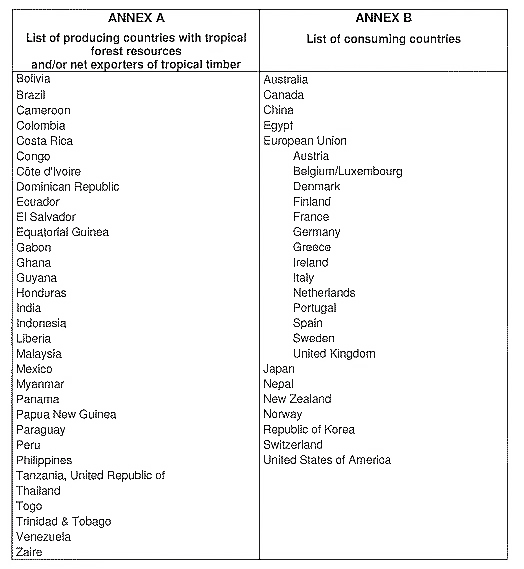The future of hundreds of thousands of people working in the tropical timber trade and industry sectors will be at stake in Geneva, where the second part of the United Nations Conference for the Negotiation of a Successor Agreement to the International Tropical Timber Agreement, 1994, is to be held (14-18 February). The 1994 Agreement, which entered into force in 1997, expires on 31 December 2005.
The Conference, organized under UNCTAD auspices, will be attended by representatives of virtually all the members of the 1994 Agreement, i.e. 33 producer countries and 26 consumer countries (see annexed lists). Together, they account for about 80% of the world´s tropical forests and 90% of the estimated $10 billion global tropical timber trade.
During the first part of the Conference (Geneva, 26-30 July 2004), participants adopted a resolution affirming their desire to reach an agreement and requesting the Secretary General of UNCTAD and the Executive Director of the International Tropical Timber Organization (ITTO, www.itto.or.jp) to prepare a document reflecting all the proposals made by the end of the first part of the Conference (see document TD/TIMBER.3/L.3, and also UNCTAD/PRESS/PR/2004/014 and UNCTAD/PRESS/PR/2004/015).
At the ITTO Council´s last session (Yokohama, December 2004), the President of the Conference, Ambassador Carlos Antonio da Rocha Paranhos (Brazil), held informal meetings towards a convergence of views. He also stressed the need not to prolong the negotiating process beyond 18 February.
Outstanding issues relate to the objectives of the Agreement within the global context of tropical timber production and trade and environmental concerns. The Agreement is intended to provide a framework for consultation, international cooperation and policy development among producing and consuming countries, to contribute to sustainable development and to enhance exports of tropical timber and timber products "from sustainably managed sources". Also central to the negotiations is financing of the implementation of the new agreement.
Negotiations on a tropical timber agreement began in the 1980s as part of UNCTAD´s Integrated Programme for Commodities and in the context of growing awareness of the dangers faced by tropical forests, more than 15 million hectares of which are disappearing annually. Less expensive, than other woods, but at the same time symbols of luxury and wealth, tropical woods like mahogany, teak and rosewood are highly prized in the industrialized countries. Yet these ancient trees are among humanity´s great treasures. It has also increasingly acknowledged that a flourishing trade in tropical timber can play a crucial role in the economic development of the countries concerned. This explains the need for sustainable forest resource management, providing valuable foreign exchange and employment while also protecting natural forests from degradation and destruction.
The tropical timber agreements are administered by the ITTO, established for that purpose in 1986 in Yokohama, Japan. Its aim is to find the right balance between promoting tropical timber trade and industry on the one hand and the sustainable management of natural forest resources on the other.
UNCTAD´s role
One of UNCTAD´s main mandates in the field of commodities is to facilitate cooperation between commodity producers and consumers and to support the work of international commodity bodies. This mandate was reinforced most recently in the São Paulo Consensus adopted at UNCTAD XI (13-18 June 2004, www.unctadxi.org), which calls on UNCTAD to pursue its action to "help to build effective partnerships among relevant stakeholders aiming at viable solutions and sustainable approaches to commodity problems". The São Paulo Conference also launched an independent international task force on commodities, one of whose main tasks will be to reassess the role of international commodity agreements in the international commodity economy.
ANNEX
Table



